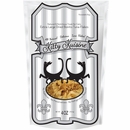What To Do If Your Pet Digested Toxic Food Or Substance
Be Prepared! If you have been in any kind of emergency, you know it is far better to stay calm and know who to call and what to do instead of panicking and wasting critical minutes that could save your pet's life. When to induce vomiting: For many types of poisoning, it is advised to induce vomiting, soon after ingestion before the chemical can do damage. These include ingestion of arsenic (in rat and mouse poisons), chocolate, insecticides, lead, matches, medications, plants, shampoo, shoe polish, slug and snail bait, strychnine, and weed killers. Before you do so, first call a vet, physician or poison emergency hotline staff member to make sure it's the right course of action. It is also critical to properly identify the ingested substance.
To induce vomiting in pets, give them household hydrogen peroxide 3% USP by mouth, using a syringe (bulb or 10cc with no needle). Do not try to pour it down their throat. Instead, pull the lips away from the side of the mouth to make a pocket, in which you will deposit the liquid. It is suggested to use 1 teaspoon per 5 pounds of the animal's weight, to a maximum of 3 to 4 tablespoons. Before dosing, first give them a little bread or other soft food so there is something to bring up along with the stomach contents. If they have not vomited after 15 minutes, repeat the dose of hydrogen peroxide one more time. After vomiting, some folks recommend giving the animal a teaspoon of Epson salts mixed in some water to help empty the intestine.
Activated charcoal is also used to induce vomiting in pets. It has the ability to absorb and deactivate many toxins, preventing the poisons from reaching the bloodstream. Activated charcoal tablets also help when you don't have access to a clean water supply. Mix a tablet of activated charcoal in 2 teaspoons of water. Give 1 teaspoon per 2 pounds body weight and follow with a pint of water. When NOT to induce vomiting: Do not induce vomiting if the animal is lethargic, unconscious, convulsing, having a seizure or is in shock. Do not induce vomiting if the animal ingested an acidic or alkaline product such as drain cleaner, household cleaners and paint thinner. Caustic and corrosive substances can burn the throat and stomach on the way back up, compounding the injury. Also, do not induce vomiting for ingestion of tranquilizers, bones, sharp objects or petroleum products such as gasoline or lighter fluid.
If the ingested substance was gasoline, kerosene, an acid or alkali, or a corrosive:
Try to give the animal milk to dilute the toxin in the stomach. Remember, for any poisoning, get to the vet as soon as possible. Temporary first aid measures alone are not enough.
When in doubt, always err on the side of caution and call your veterinary clinic or pet emergency hospital. It is better to be wrong and have your pet live rather than to regret not taking any action if it is indeed something serious.
Do yourself and your pet a favor by having on hand these three important things:
- Veterinarian’s contact information
- Emergency Hospital contact & location information
- First Aid Kit
Other signs that you should take your pet to the veterinarian, day or night. Seizure, fainting or collapse. Eye injury, no matter how mild. Vomiting or diarrhea - anything more than two or three times within an hour or so. Allergic reactions, such as swelling around the face, or hives, most easily seen on the belly. Snake or venomous spider bites. Thermal stress - from being either too cold or too hot. Any wound or laceration that's open and bleeding, or any animal bite. Trauma, such as being hit by a car, even if the pet seems fine. (Internal bleeding) Any respiratory problem: chronic coughing, trouble breathing or near drowning. Straining to urinate or defecate. *The recommendations seen here is for informational purposes and EntirelyPets is not responsible for the outcome of these tips... It is always the pet owner's responsibility to contact their veterinarian in an emergency.










